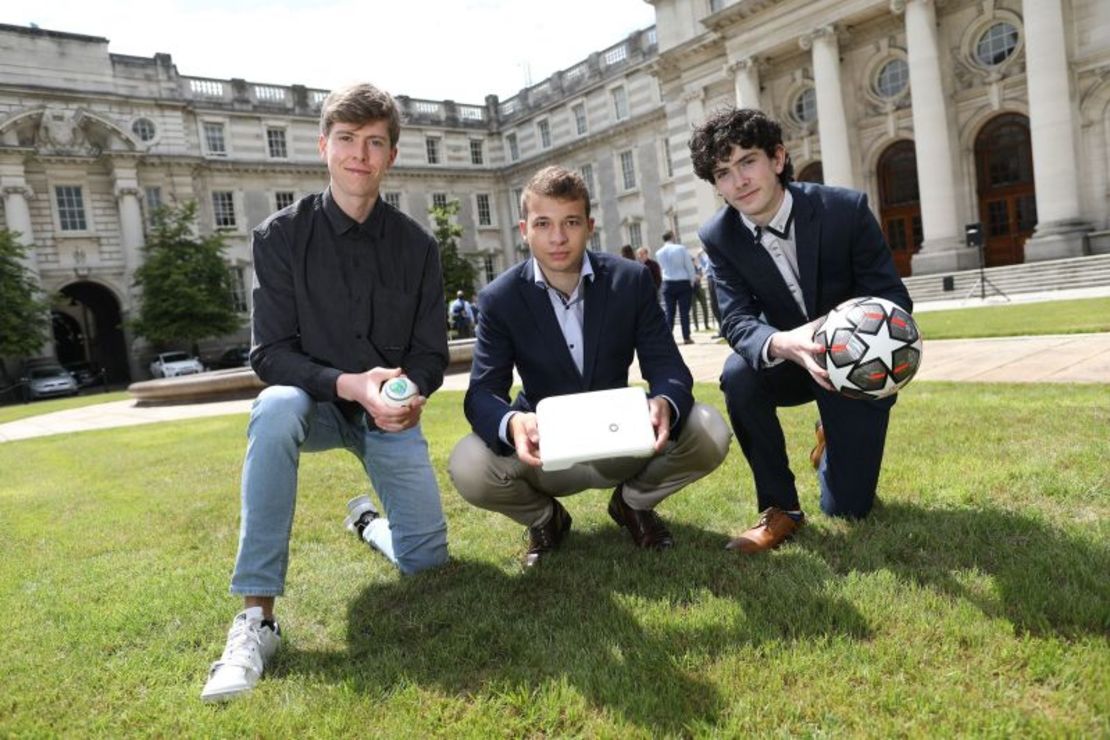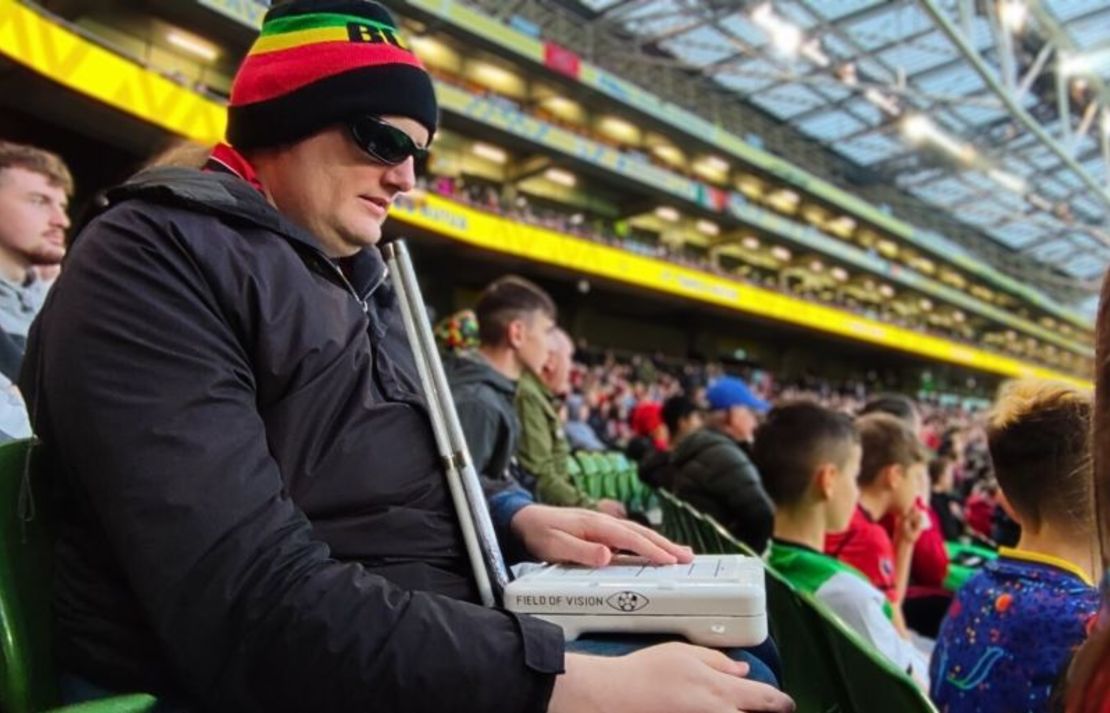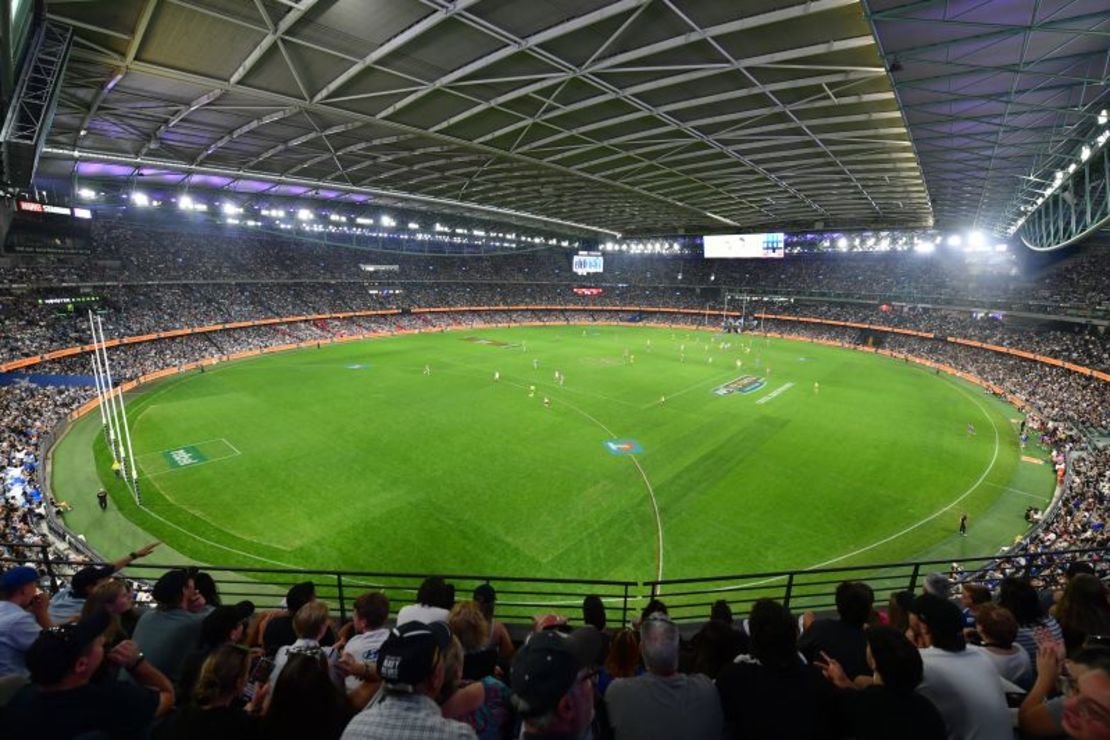() – For visually impaired sports fans in stadiums around the world, following a game often means relying on commentators or those around them to describe the action. Now, an Irish startup is looking to create a more level playing field.
Dublin-based Field of Vision has produced a device haptic feedback wearable that it claims can help blind and partially sighted fans not only hear but also “feel” the action, improving the live experience.
Custom cameras located in each corner of the stadium use artificial intelligence (AI) to track key details of a match. In about half a second, this information is transmitted to a white tablet-sized device in the shape of an embossed sports field, which weighs less than a kilogram and rests on the user’s lap.
A small magnetic ring guides the user’s finger around the tablet (similar to movement on a Ouija board) based on where the ball is and vibrates to convey various game events, such as a tackle or a change of possession.
The device is designed to enhance descriptive audio commentary rather than replace it entirely, with a built-in headphone jack allowing users to access audio commentary if the stadium provides a signal.
“The main feedback we’ve gotten (about the device) has been that it really makes them feel like they’re part of the game and experiencing it with everyone else,” Field of Vision co-founder David Deneher told .
Deneher launched the business with two friends, Tim Farrelly, a fellow student at Trinity College Dublin, and Omar Salem, a student at Queen’s University Belfast, in 2020, while they were looking for something to kill time during the coronavirus lockdown. covid-19.
Salem, an aerospace engineering graduate, first imagined the idea after seeing images on social networks of Liverpool fan Mike Kearny, who has some degree of visual impairment. In the stands of the Anfield stadium of the English Premier League giant, Kearny’s cousin, Stephen García, was next to him and explained the action.
With 320,000 people registered as blind or partially sighted in the UK alone, according to the Royal National Institute of Blind People (RNIB) and some 43 million blind people worldwide, Field of Vision’s technology could potentially improve the experience live sports for a large number of fans.

Declan Meenagh, a fan of Dublin football club Bohemians, was born with a genetic eye disease that limits his vision to 5%. Meenagh can’t see beyond the crossbar, even if he’s sitting in the front row behind the goal at the team’s Dalymount Park stadium.
Club volunteers who describe matches for visually impaired spectators let you follow them through a headset, but you can miss key lines when the crowd gets loud.
He said a trial with the Field Of Vision tablet added new levels of context to procedures in the field.
“Really feeling where the ball is and what’s happening is really a game changer,” he told .
“It helps a lot because you have a two-dimensional understanding of where (the ball) is on the field and how it moves, and you really feel like things are moving very quickly, it’s really good.”

Field of Vision was a finalist for the James Dyson Award (an international student design award) in 2021 and is on Time Magazine’s list of Best Inventions of 2022. In June it won best initiative to promote inclusion and physical activity at the Irish Sports Industry Awards.
The company has raised about 250,000 euros (approximately US$273,412) in funding, most of which comes from business acceleration programs; The monetary prizes obtained in various competitions have also injected capital.
The founders were advised by sports industry executive Tom Sears, and after the technology was tested in the Bohemianwhose ground has a capacity of less than 5,000 spectators, last year helped organize the first tests of the prototype at Manchester City’s Etihad stadium, which can seat more than 50,000 fans. As part of a trial, the device was used by three participants in seven of the club’s home games.
It served as ideal preparation for a full launch at the approximately 53,000-capacity Marvel Stadium in Melbourne, Australia, which is home to five Australian rules football teams, a completely different sport than soccer.
After the 2024 season ended in September, cameras were installed in the stadium and the AI was retrained to record match details on the oval-shaped field. Marvel Stadium will offer 40 devices at every match played there during next year’s Australian Football League (AFL) season.

The device’s ability to be reprogrammed for a sport very different from soccer suggests a future for the business that could expand far beyond the soccer field.
“In the long term, we want to expand to all the major sports in the world and make it a standard for the stadiums and live broadcast venues that they have within their infrastructure,” Deneher said.
Field of Vision is currently in the process of selling the product to soccer teams in Europe’s top five leagues (England, Spain, France, Germany and Italy) and Deneher said there are also “immediate plans” to start selling in the markets. Americans and expand further into the AFL.
Clubs would pay an annual subscription for the AI model, cameras and match streaming service and another to rent the tablets annually.
A subscription-based model was chosen rather than selling the system outright to account for the likely fluctuating number of visually impaired fans each season, as well as to allow devices to be exchanged for potential repairs, Deneher explained.
Prices are still being finalized, but will depend on the respective demands and stadium sizes of each club. He added that while the technology may be perceived as a luxury right now, it could one day become as common as wheelchair ramps.
“We just want to make football and live sports more accessible to everyone,” Deneher said. “Therefore, the plan is to expand to more stadiums, more countries and more sports for the future.”



![[Img #74675]](https://thelatestnews.world/wp-content/uploads/2024/12/They-discover-a-new-class-of-X-ray-sources-in-the-150x150.jpg)









![[Img #74675]](https://thelatestnews.world/wp-content/uploads/2024/12/They-discover-a-new-class-of-X-ray-sources-in-the-300x200.jpg)


Add Comment